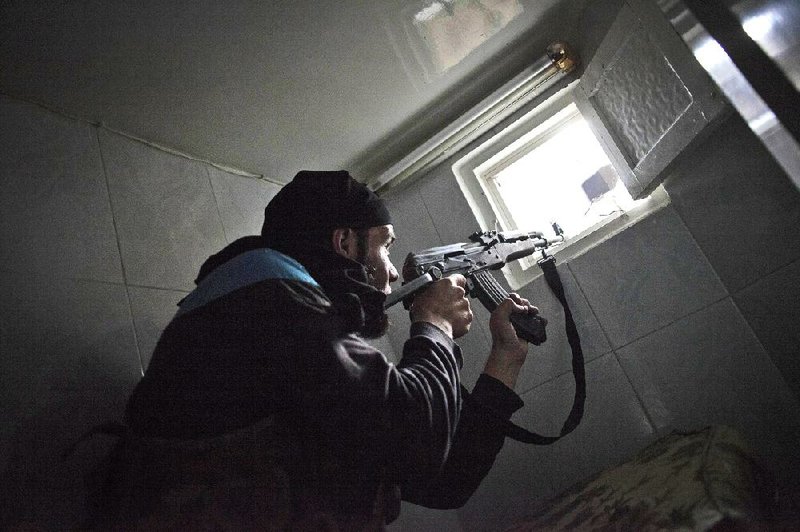BEIRUT — State television in Syria issued a withering attack late Monday on a longtime ally, the leader of the Palestinian militant group Hamas, Khaled Mashaal, addressing him as if he were an ungrateful child, saying he was having a “romantic emotional crisis” over the Syrian uprising and accusing him of selling out “resistance for power.”
INTERACTIVE
The extraordinary reproof, a departure from the blander tone of most Syrian official statements, was the government’s first broadside against Hamas since the organization distanced itself from embattled President Bashar Assad earlier this year, when most Hamas leaders left their refuge in Damascus and shuttered their office there.
The attack was a television editorial delivered by a newscaster in alternately stern and mocking tones, who reminded Mashaal that he was “orphaned” by Arab countries who would not take him in when he fled Jordan in 1999. She implied that he must have sold out to Israel, saying that was the only explanation for the willingness of Qatar, his new host, to accept him.
Damascus seemed to be striking back after Mashaal appeared at a congress of the party of Turkey’s prime minister, Recep Tayyip Erdogan, and after Erdogan and Egypt’s president, Mohammed Morsi, pointedly declared their shared priorities of opposing Assad and supporting the Palestinians - a blow to Assad’s long-standing and domestically compelling persona as the champion of Palestinian resistance against Israel.
Hamas did not immediately respond to the attack on Mashaal, who recently announced plans to step down from the group’s helm. But at the party congress Sunday in Ankara, after praising Syria’s uprising, Mashaal declared, “There is no contradiction in our adoption of democracy and reform, and our support of the resistance.”
Damascus is likely particularly furious that Mashaal has taken up residence in Qatar, one of the countries, along with Saudi Arabia and the United States, that it accuses of bankrolling the insurgency.
Syria, Iran, the Lebanese militant group Hezbollah and Hamas long considered themselves an “axis of resistance,” in contrast to Arab countries - notably Egypt - that pursued a more accommodationist policy with Israel and the United States. But relations in the axis have teetered as some of Syria’s Palestinians have joined the uprising and as some Hamas officials find it impossible not to sympathize with fellow Sunni Muslims in Syria, who form the bulk of the anti-Assad movement and have borne the brunt of Assad’s brutal crackdown.
But Hezbollah remains a steadfast ally, although it has denied allegations by domestic opponents and the U.S. that it has aided in Syria’s crackdown. On Tuesday, Hezbollah’s website reported that a senior commander in the group, Ali Hussein Nassif, had died carrying out “jihadist duties.” A Lebanese security official said that Nassif died in Syria. It was unclear whether he was fighting alongside Syrian forces.
The verbal assault on Mashaal came amid a Damascus public-relations offensive of sorts, hours after Foreign Minister Walid al-Moallem told the U.N. General Assembly that Syria’s 18-month uprising was a terrorist movement being financed by the United States and its allies to weaken Syria, and that Syrians who had fled the country had been manipulated by Syria’s neighbors in a coldhearted plot for those countries to demand foreign aid.
The newscaster who delivered the rebuke to Mashaal also castigated Egypt and Turkey for what it said was their complicity in the Palestinians’ plight.
At certain points its tonebecame downright snide: “Mashaal, since you are having a romantic emotional crisis over what you call the suffering of the Syrian people,” the newscaster said, “why didn’t the Palestinian people elicit the same emotional reaction?”
She recalled how Syria defied other powers to grant him refuge in 1999.
“The plane that was carrying him was sent back from the skies of airports as if he was the plague,” she intoned. “Doha and Ankara and Amman and Cairo all evaded him that day because Israel had vetoed his reception, and no one dared to defy this veto except Damascus.”
Addressing him directly, she continued, “The only possible interpretation for their sudden welcoming attitude today is that you are no longer wanted by the occupation” - referring to Israel’s occupation of Palestinian territories- “and no longer a threat to their safety.”
She offered a barely veiled “good riddance.”
“Syria is not regretful because it didn’t do what it did expecting loyalty or thanks,” she said. “Syria is happy that the person who sold resistance for power is leaving it now.”
Elsewhere, Iraqi authorities Tuesday ordered an Iranian cargo plane heading to Syria to land in Baghdad for a search, then allowed the flight to proceed after no weapons were found.
The unprecedented move appeared to be an attempt to ease U.S. concerns that Iraq is allowing Iran to fly military supplies to help Assad battle rebel forces.
In other developments, an American freelance journalist who has been missing in Syria since mid-August has been shown in a video clip posted online, blindfolded and saying “Oh, Jesus” in a frightened voice in the custody of armed men.
The video, which came to light Monday, was the first sign of Austin Tice’s condition since he disappeared more than seven weeks ago. Tice, a 31-year-old former Marine, had been reporting on Syria’s civil war for The Washington Post, McClatchy Newspapers and others.
Although the footage shows a group of captors dressed like Islamic extremists and shouting “God is Great,” the clip lacks the customary appearance of jihadist videos.
The discrepancies have raised concerns that the video was staged to make it appear Tice was being held by extremists. Previous reports have indicated that Tice is in government custody, although Assad’s regime has not acknowledged holding him.
Information for this article was contributed by Anne Barnard and Hania Mourtada of The New York Times and by Elizabeth A. Kennedy and Sameer N. Yacoub of The Associated Press.
Front Section, Pages 8 on 10/03/2012

